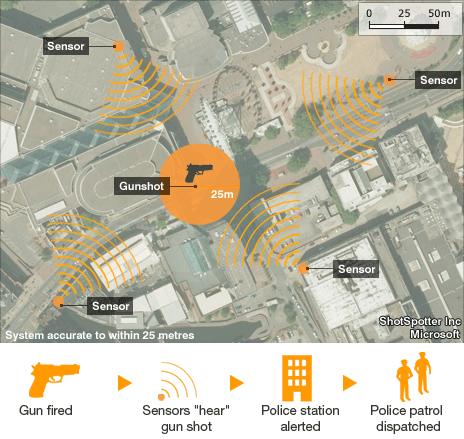US-style gunshot sensors installed in Birmingham
- Published
Sensors used in the US to detect gunshots being discharged have been installed in areas of Birmingham with a high number of firearms incidents.
It is the first time the Shotspotter Gunshot Location System - which can detect a gunshot to within 25m (82ft) - has been deployed in the UK.
West Midlands Police said the sensors had been placed high up on buildings in north-west areas of the city.
The £150,000 system records an audio clip and sends police a GPS location.
A police officer trained to listen to the clips then makes a judgement on what they have heard before deploying officers.
The system, funded by the Home Office through Birmingham Safer Partnerships, has an 85% accuracy rate, Ch Supt Chris McKeogh said.
It can tell if multiple shots were fired, or if they were fired from a stationary or moving location, the number of weapons used and in which order they were fired, according to the manufacturers.
The system has been introduced in more than 50 US cities since 1995.
"The sound waves a bullet produces have a particular signature, if you like, and that should be recognisable to our force control room officers that have been trained up to listen," Mr McKeogh said.
"Shots, or a shot, being fired outside have the best chance (of being detected).
"Inside, or with a silencer, the ability is not so good, understandably."
The system, called Project Safe and Sound, will be active from Thursday. It is being used in the West and Central local policing unit, which covers areas including Handsworth and Aston.
Figures show the unit has the highest rate of gun crime in the force area.
A police report said this justified the use of the system, which it said was not targeting people in black and Asian communities.
Inspector Greg Bates: "It'll pinpoint the location down to 25m"
Overall, the number of firearm incidents recorded in Birmingham has gone down since 2007/8.
The sensors have been placed on buildings owned by the council, some schools and private businesses.
Police will not elaborate on exactly where they are or what they look like.
Mr McKeogh said members of the neighbourhoods concerned had been consulted since the inception of the project some 18 months ago after West Midlands officers saw the system at work in the US.
Last month the force agreed to remove so-called spy cameras installed in parts of Birmingham with large Muslim populations after being criticised for not properly consulting residents.
Raj Rattu, a member of Handsworth residents' group and part of the force's Trust and Confidence group, said he was reassured by the approach the force had adopted for the gunshot sensors project.
He said 400 residents attended one meeting, where "mixed views" were expressed.
"Some are for it, some are against it, and we understand police are caught in a dilemma.
"We want guns off our streets and gun crime is falling, but we are reassuring residents that the areas are safe and we're working with the police."
The project will be reviewed after six months and again after a year.

- Published2 December 2010